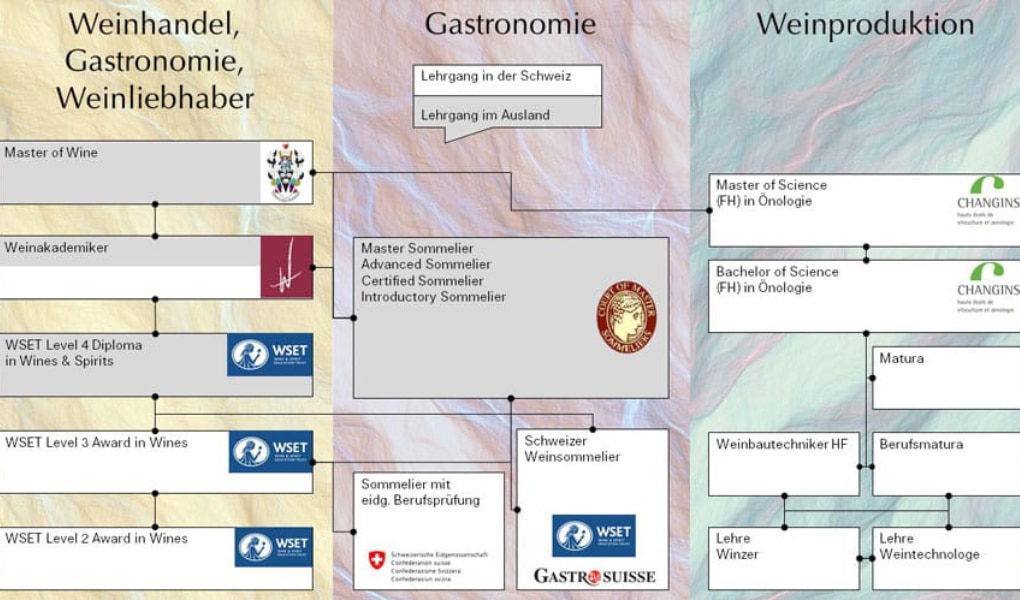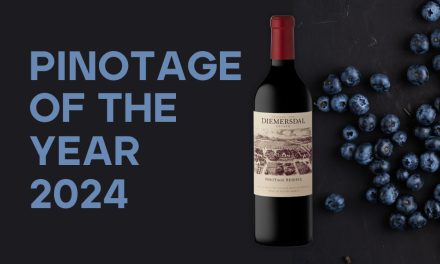From passion to expertise
Finding your way in the world of wine experts
More and more people are discovering their passion for wine and seeking a sound wine education. However, with so many wine courses available, it is not easy to find the right path. Which training programme is the best choice? Which degrees are internationally recognised? And who are your fellow students – private wine lovers, professionals from the wine trade and catering industry or even winemakers?
There is a wide range of wine education opportunities, from local to international. Some qualifications are only relevant in Switzerland, while others are recognised worldwide. Globally recognised qualifications include, for example, the WSET (Wine & Spirit Education Trust), the CMS (Court of Master Sommeliers) and the MW (Master of Wine).
The WSET offers comprehensive training in wine and spirits, while the CMS specialises in the training of sommeliers. The title «Master of Wine» (MW) is considered one of the most demanding qualifications in the wine industry and recognises experts with in-depth knowledge.
Some of the most famous names to hold the title «Master of Wine» are Jancis Robinson, Tim Atkin and Neal Martin. Jancis Robinson is a renowned British wine journalist and author, while Tim Atkin has made a name for himself as a British wine expert and critic, particularly in the field of South African wines. Neal Martin, like the American wine critic Robert Parker, is an important player who has significantly influenced the world of wine through his contributions and assessments.
Find out more about wine critics and wine magazines in our article.

Foto: academie-du-vin.ch
Where do you start?
The path to becoming a wine critic is long but fulfilling. The world of wine offers a fascinating journey through flavours, terroirs and traditions, which for true wine lovers often turns into something more – the pursuit of becoming a wine critic. This challenging path requires expertise, experience and a deep passion for fine wines.
The basis for aspiring wine critics lies in a solid understanding of wine regions, grape varieties and production techniques. Books, courses and wine tastings can be helpful here. However, it is not only theoretical knowledge that is required – the training of sensory skills also plays a decisive role. A trained palate enables the precise recognition of aromas and flavours.

Further education institutes such as the WSET offer structured courses and certificates that can facilitate the path to becoming a wine critic. It offers various levels of wine qualification that differ in their complexity and scope of knowledge.
The entry level, WSET Level 1 Award in Wines, offers basic knowledge for beginners and wine enthusiasts. With the WSET Level 2 Award in Wines, participants deepen their knowledge of wine regions, grape varieties, winemaking and wine pairing. Advanced wine enthusiasts, industry professionals and those seeking a more in-depth qualification opt for the WSET Level 3 Award in Wines. The highest level, the WSET Level 4 Diploma in Wines, offers an advanced and comprehensive knowledge of wine, suitable for experienced professionals and those seeking a career in wine.
Practical experience, whether at wineries, in the wine trade or in the catering industry, is highly valuable. Networking also plays a crucial role – exchanging ideas with like-minded people and experienced wine connoisseurs broadens your own understanding.
Personal visits to wine regions make it possible to get to know and understand differences in terroirs and cultivation methods. The willingness to obtain feedback from experienced wine connoisseurs and to complete continuous further training keeps the future wine critic up to date at all times.
Practice makes the difference
Discover the world of wine critics – through the best-rated wines! Experience the magic of wine at our exclusive wine tasting in April – «Praised by wine critics». A must for all wine lovers! Start your wine journey now!









